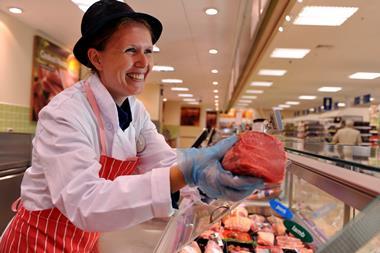It’s looking like an ‘annus horribilis’ for retailers, as inflation, including food price inflation, eats into discretionary spend. The latest figures out today from ONS revealed retail sales fell 0.3% from January to February, with food sales down 0.2% and non-food sales plummeting by 7%.
But while sales are inevitably going to take a battering this year, retailers mustn’t forget their staff are also feeling the pinch.
According to the Living Wage Foundation, 42% of all supermarket workers in the UK – or 366,000 workers in total – earn below the real living wage. And the Independent Food Aid Network (IFAN) reports it has seen an increase in supermarket workers using its food banks during the pandemic.
It’s an issue that this week resulted in an investor coalition managing £2.2 trillion in funds to file a shareholder resolution demanding Sainsbury’s pays a real living wage to all its workers.
But Sainsbury’s isn’t the only supermarket failing to pay all of its workers the real living wage. According to the Living Wage Foundation, not one UK supermarket is an accredited Living Wage Employer.
Indeed, Sainsbury’s is arguably performing better than most of its rivals on pay, having in January announced plans to give all shopworkers a pay rise, which the Living Wage Foundation said would “make a huge difference to thousands of the supermarket’s workers up and down the country, guaranteeing them a wage that covers the cost of living and means they can live a life of dignity”.
Having invested over £100m in “colleague reward”, Sainsbury’s is now paying a minimum hourly rate of £10, rising to £10.50 for staff in outer London and £11.05 to staff in inner London. That’s better than most of its big four rivals – and not far behind Aldi and Lidl.
Still, while it seems a bit unfair (and potentially counterproductive) to single out Sainsbury’s given its recent efforts, the action should serve as a warning sign to all that the activist shareholder battleground has spread from a single-minded focus on HFSS, to tackle employee rights for the first time.
After the pandemic shone a light on the crucial role shopworkers play in keeping the nation fed, many supermarkets increased pay, and gave out bonuses. But they cannot afford to rest on their laurels when it comes to paying their staff because everyone is struggling to attract staff at the moment, while consumer expectations around customer service are still extraordinarily high.
Supermarkets are already ahead of the curve when it comes to meeting the new national living wage (the statutory minimum for workers aged 23 and over), which is rising by 6.6%, from £8.91 to £9.50 from April 2022. But groups like ShareAction and the Living Wage Foundation claim businesses need to pay the real living wage of £9.90 (or £11.05 in London) to ensure their staff have remuneration that “meets everyday needs – like the weekly shop, or a surprise trip to the dentist”.
It’s understandable, of course, that supermarkets are reluctant to make further commitments now, given the huge cost pressures they are facing, alongside the squeeze on household budgets.
But arguably, it’s the UK’s low-paid workers who are facing the real ‘annus horribilis’. And the public, like investors, won’t be looking kindly on any grocery businesses whose staff can’t afford to put food on their own table.




















No comments yet